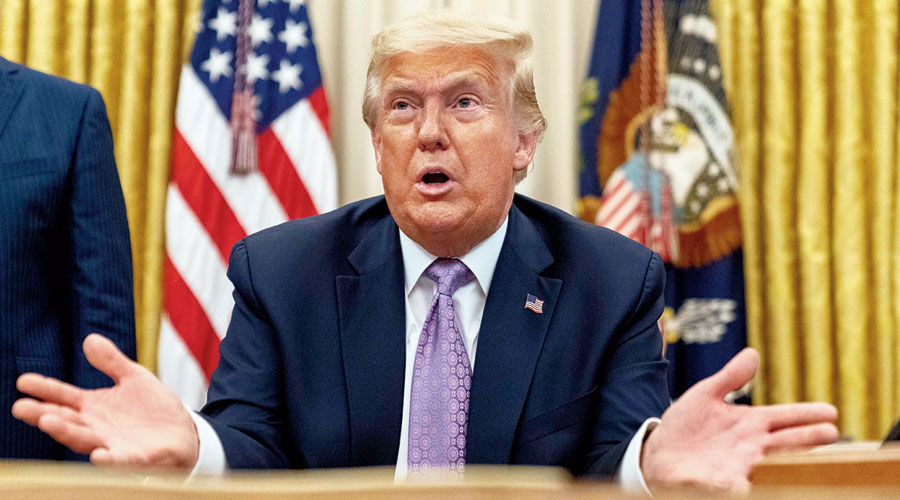Israel and the United Arab Emirates have announced they would normalise diplomatic ties and forge a broad new relationship, a move that reshapes the order of West Asian politics from the Palestinian issue to Iran.
Under the accord, which US President Donald Trump helped broker, Israel has agreed to suspend its planned annexation of areas of the occupied West Bank. The agreement also firms up opposition to regional power Iran, which the UAE, Israel and the US view as the main threat in the conflict-riven region.
If fulfilled, the agreement would make the UAE the third Arab country to establish normal diplomatic relations with Israel after Egypt and Jordan.
The agreement — to be known as the Abraham Accords — could reorder the long stalemate in the region between Israel and its neighbours, potentially leading other Arab nations to follow suit while taking Prime Minister Benjamin Netanyahu’s explosive annexation plan off the table at least for the moment.
But it could also generate a backlash among Israeli settlers and their political allies who have been anxious to establish sovereignty over West Bank territory as well as from Palestinians who feel abandoned by an Arab ally to remain locked in an untenable status quo even without the threat of annexation looming.
The agreement gives Trump a foreign policy accomplishment as he seeks re-election on November 3. Presumptive Democratic presidential candidate Joe Biden hailed the deal as a historic step towards a more stable West Asia.
The agreement was the product of lengthy discussions between Israel, the UAE and the US that accelerated recently, White House officials said.
A joint statement said Trump, Israeli Prime Minister Benjamin Netanyahu and Abu Dhabi’s Crown Prince Sheikh Mohammed Bin Zayed had “agreed to the full normalisation of relations between Israel and the United Arab Emirates”.
“This historic diplomatic breakthrough will advance peace in the Middle East region and is a testament to the bold diplomacy and vision of the three leaders and the courage of the United Arab Emirates and Israel to chart a new path that will unlock the great potential in the region,” the statement said.
In a separate statement, the crown prince stressed that the agreement would stop further Israeli annexation of Palestinian territories, which Israel has said had been awaiting a green light from Washington.
Trump tweeted: “HUGE breakthrough today! Historic Peace Agreement between our two GREAT friends, Israel and the United Arab Emirates.”
In the White House Oval Office, Trump said similar deals were being discussed with other countries in the region.
Biden welcomed the deal but warned he would not support Israel’s annexation of Jewish settlements if he wins the White House in November.
“The UAE’s offer to publicly recognise the State of Israel is a welcome, brave, and badly needed act of statesmanship,” Biden said. “Annexation would be a body blow to the cause of peace, which is why I oppose it now and would oppose it as President.”
The UAE said it would remain a strong supporter of the Palestinian people and that the agreement maintained the viability of a two-state solution to the longstanding Israel-Palestinian conflict. There was no immediate reaction from the Palestinians, who hope to create an independent state in the occupied West Bank, Gaza and East Jerusalem.
Netanyahu said the agreement represented a “historic day” for his country.
A senior Israeli official said that applying Israeli sovereignty to areas of the West Bank was still on the agenda, adding: “The Trump administration asked us to temporarily suspend the (sovereignty) announcement so that the historic peace agreement with the UAE can be implemented.”
The Tasnim news agency, affiliated with Iran’s powerful Revolutionary Guards, called the accord “shameful”.











